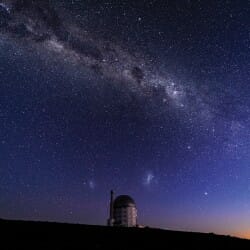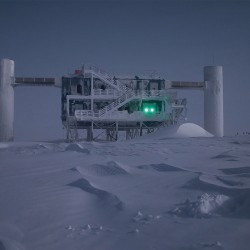Are We Alone in the Universe?
The Wisconsin Center for Origins Research searches for answer to the biggest cosmic questions.

The Wisconsin Center for Origins Research will put students on the cutting edge of the biggest questions in origins-of-life research. Danielle Lawry
To tackle the biggest questions, it helps to have a big team. And there aren’t many questions more massive than the ones related to the origins of life on Earth and whether other worlds — the ones we already know and the ones we have yet to discover — could someday support life.
“This is one of humanity’s biggest existential questions: Are we alone in the universe?” says Richard Townsend, UW professor of astronomy. “Even if the only other thing in the universe is single-celled organisms or some weird sort of crystalline silicon life, it doesn’t matter. It’s a complete philosophical game changer.”
The team Townsend is currently assembling could be a complete game changer, too. The Wisconsin Center for Origins Research is a new multi-disciplinary group that includes researchers from astronomy, chemistry, integrative biology, geoscience, bacteriology, botany, and atmospheric and oceanic sciences.
“The study of life’s origin on Earth and potential origin elsewhere in the universe is catching fire now, thanks to new theories, novel experimental approaches, and the excitement of upcoming solar system exploration,” says David Baum, a professor of botany who studies the evolution of living organisms. “The UW has great strength in this area, but until now we have not been well coordinated.”
Astrochemist Susanna Widicus Weaver was recruited to Madison in 2020. Shortly thereafter, a more expansive origins-of-life cluster of faculty positions was approved, resulting in three new assistant professors flocking to UW–Madison. Betül Kaçar, a professor of bacteriology, is an astrobiologist who studies ancient DNA. Thomas Beatty, a professor of astronomy, studies signs of life on exoplanets. Zoe Todd, whose appointment is split between chemistry and astronomy, studies early Earth chemistry and the delivery of biomolecules via impacts from comets and meteorites.
The Wisconsin Center for Origins Research will put students on the cutting edge of the biggest questions in origins-of-life research.
“We will offer experiences that give students skill sets they can’t develop anywhere else,” says Widicus Weaver.
And maybe, just maybe, they’ll answer some of the universe’s biggest questions.
Published in the Spring 2024 issue



Comments
No comments posted yet.